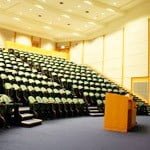According to a recent study from the University of Washington, Seattle, traditional lecturing methods are detrimental to students’ learning. The latest findings, published by the Proceedings of National Academy of Sciences, show that students in traditional lectures are 1.5 times more likely to fail than those who have been taught through active teaching methods such as group activities and questioning.
Since 1050, when Universities were founded in Western Europe, learning methods have been based on the simple concept of a lecturer standing on a stage and delivering a talk on their specialist topic, however, Scott Freeman, a biologist who led the study, says things have to change. Freeman says that methods of teaching that allow the students to become active rather than passive listeners are the key.
The study analysed 225 undergraduate STEM teaching methods and found that active teaching methods showed significant improvements in students’ grades. Individual’s exam results improved by about 6%; meaning a student could jump up a grade.
Eric Mazur, a physicist at Harvard University and a campaigner against traditional lecturing techniques for the past 27 years, says that these results make it “almost unethical to be lecturing”. He says that the study proves that current lecture methods are “outdated and inefficient”.
Freeman advises using techniques such as PowerPoint slides, having students explain concepts to each other and random calling of students during a class, all help to engage students and improve their learning. He stated that this type of learning would help students who may otherwise fail or drop STEM courses.
This current study is not the first time traditional lecturing methods have been put under the spotlight; the introduction of Massive Open Online Courses (MOOCs) over the past few years have changed the traditional structure by delivering classes to thousands of students online. Online learning has raised questions about whether there is a need for lecturers at all. According to a study carried out by the U.S. Department of Education, there is no difference between being lectured at online or in college.
Freeman says that while there are certain times when lectures are needed, the traditional mode of the ‘sage on the stage’ needs to be combined with more stimulating methods of teaching that will promote student learning and prepare future teachers.
Author: Fiona McBennett
